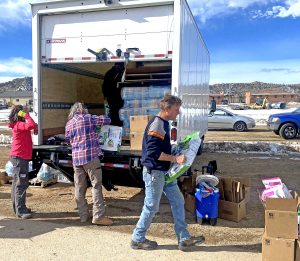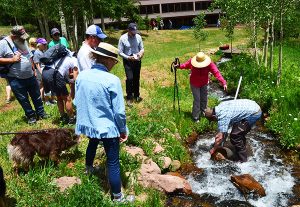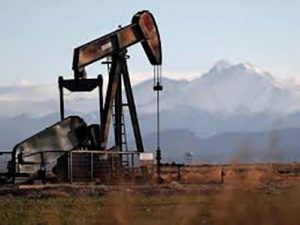by Eric Mullens
HUERFANO — Huerfano County residents who live within a mile of any of the four Shell oil wells under development now have the opportunity to receive free (before and after drilling) well water testing as part of a National Science Foundation’s Sustainable Research Network Grant.
Al Tucker, as a member of the Arkansas Basin Roundtable, hosted Dr. Stephen Osborn, Assistant Professor of Geological Sciences, California State Polytechnic University and CU grad student Jessica Dehart on Tuesday at the La Plaza Inn and learned about the program that has been ongoing for the past year in Colorado and other areas of the nation where fracking is taking place or under consideration by oil and gas developers.
Tucker will be the point person in Huerfano County and those residents interested in having their water wells in the study may contact him at altucker63@gmail.com. “This is a big issue, being in on the ground floor of this kind of study,” Tucker said. Those interested in participating in the well water study are strongly encouraged to contact Tucker immediately as Osborn said they would like to have a list of participants quickly so the before drilling activity baseline data may begin being taken. Participation in the well water sample program can save residents hundreds, if not thousands of dollars, of the cost of having their well water tested. On average, a private water sample and results can cost a well owner $700 to $1,100.
The grant program offers participants a full explanation of water sample findings on samples that will be taken before drilling, after drilling and during the actual fracking process; if that takes place. The participant will agree the study results may be used in any or all scientific papers developed from the study. Residents’ names and specific addresses will not be used in the study.
The grant program’s Colorado connection began last year with field work in Weld County and will expand into Huerfano and Garfield counties and possibly into Wyoming in the remaining four years of the project. “Some of these well locations may be monitored throughout the duration of the study,” Osborn said.
Osborn stressed the importance of gaining baseline studies before drilling activity takes place at the well sites near both La Veta and north of Gardner. Test results will be completed within about three months of samples being taken, however Osborn said results will not be released to the well owners until all samples have been collected and analyzed, except in the case where any dangerous substance is found in the well water whenever the sample has been taken. For human and environmental safety, that information will be passed on to the well owner as soon as it is discovered.
At this time, the project is seeking those wells owners who live near the Fortune and Seibert well sites near Gardner, and the Andreatta and Cadwell 2 sites near La Veta. Osborn said a larger area of samples adjacent to those sites could be part of an expanded study next summer.
The University of Colorado Boulder is the lead institution for a Substantiability Research Network (SRN) funded by the National Science Foundation. The Network will engage 27 researchers at nine institutions: California State Polytechnic University Pomona; Colorado School of Mines; Colorado School of Public Health (University of Colorado Denver); Colorado State University; National Oceanic and Atmospheric Administration; National Renewable Energy Laboratory; University Center for Atmospheric Research; University of Colorado Boulder, and University of Michigan.
The mission of this Substantiability Research Network (SRN) is to provide a logical, science-based framework for evaluating the environmental, economic, and social trade-offs between development of natural gas resources and protection of water and air resources and to convey the results of these evaluations to the public in a way that improves the development of policies and regulations governing natural gas and oil development.
The SRN website, airwatergas.org, says of the project’s mission, “Our goal is to find the balance between maximizing the development of natural gas and oil resources – for the benefits of short-term reduction of carbon dioxide emissions from power generation and transportation, national energy independence, and national job growth – and minimizing damage to water and air resources and risks to human health”.

Breaking news: Results of Walsenburg Mayor race and recall election
Gary M. Vezzani was elected Walsenburg’s mayor in Tuesday’s special mayoral election/recall vote. Preliminary results announced Tuesday night show that both Nick Vigil in Ward



